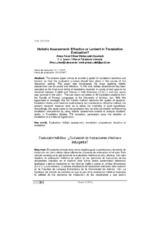Holistic Assessment: Effective or Lenient in Translation Evaluation?
Evaluación holística: ¿Evaluación de traducciones efectiva o indulgente?

Ver/
Autor
Akbari, Alireza
Gholamzadeh Bazarbash, Monir
Editor
UCOPressFecha
2017Materia
EvaluationHolistic assessment
Translation competence
Direction of translation
Evaluación
Evaluación holística
Competencia traductora
La direccionalidad de la traducción
METS:
Mostrar el registro METSPREMIS:
Mostrar el registro PREMISMetadatos
Mostrar el registro completo del ítemResumen
The present paper strives to provide a guide for translation teachers and trainers on how the evaluation process should take place in the course of the classroom setting. This paper also investigates the ways applying holistic assessment can be useful and effective. To this end, holistic assessment has been operated on the final exam drafts of translation students. A variety of text types to be rendered between English and Persian in both directions (L2 to L1 and vice versa) was covered in the exam. The test-takers consisted of 40 translation students from the Faculty of Foreign Languages at the University of Isfahan, Iran. With this hypothesis in hindsight that the holistic method improved the quality of students` translation drafts, and therefore could suitably be considered an effective method, the present research however went on to refute the credibility of such hypothesis. Accordingly, this study came to the conclusion that no strict connection on improving translation competence by using holistic assessment existed to analyze students’ drafts in Translation Studies (TS hereafter), particularly once the direction of translation is a matter of significance. El presente artículo tiene como objetivo guiar a profesores y docentes de traducción en cómo deben desarrollarse los procesos de evaluación en el aula. Este artículo investiga si la aplicación de la evaluación holística es útil y efectiva. Con este objetivo, la evaluación holística se aplicó en los ejercicios de traducción de los estudiantes incluidos en el examen final. Estos textos presentaban diferentes tipologías y debían traducirse en los idiomas inglés y persa en ambas direcciones (L2 a L1 y a la inversa). Cuarenta estudiantes de traducción realizaron este examen en la Facultad de Lenguas Extranjeras de la Universidad de Isfahán, Irán. La hipótesis del artículo se centraba en que el uso de la evaluación holística mejoraba la calidad de los ejercicios de traducción de los estudiantes y que podría considerarse un método adecuado y efectivo. No obstante, dicha hipótesis no pudo probarse. En consecuencia, este estudio llegó a la conclusión de que no existe una conexión estricta en cuanto a la mejora de la competencia traductora mediante el uso de la evaluación holística en los ejercicios de los estudiantes de estudios de traducción, especialmente si se tiene en cuenta la direccionalidad de la traducción como factor decisivo.
